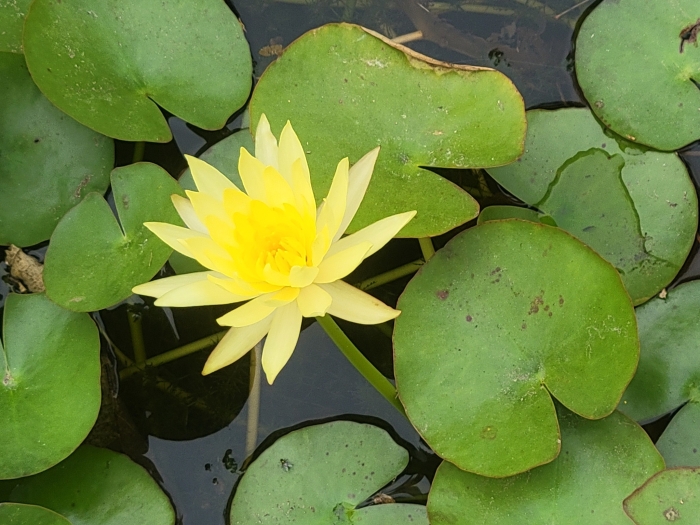Yellow Waterlily
(Nymphaea mexicana)
Yellow Waterlily (Nymphaea mexicana)
/
/

johnyochum
CC BY 4.0
Image By:
johnyochum
Recorded By:
Copyright:
CC BY 4.0
Copyright Notice:
Photo by: johnyochum | License Type: CC BY 4.0 | License URL: http://creativecommons.org/licenses/by/4.0/ | Rights Holder: johnyochum | Publisher: iNaturalist | Date Created: 2021-04-30T14:34:49-07:00 |



























Estimated Native Range
Summary
Nymphaea mexicana, commonly known as Yellow Waterlily, is an evergreen perennial herb native to freshwater habitats such as ponds, slow-moving streams, and marshes in the US Gulf Coast states and Mexico. It typically grows to a height of 0.7-1 feet (0.2-0.3 meters) and spreads 1-2 feet (0.3-0.6 meters) wide. The plant’s appearance is characterized by its floating leaves, which are round and sometimes slightly heart-shaped, and its distinctive yellow flowers. These blooms are quite showy, with bright yellow petals and greenish-yellow, star-like sepals that close at night. Flowering occurs mainly in the summer, but in warmer climates, it can also extend into spring and fall.
The Yellow Waterlily is valued for its ornamental flowers and ability to provide cover for aquatic wildlife. It is often used in water gardens, ponds, and managed wetland areas. While it thrives in full sun to part shade, it requires high amounts of water and prefers soils with medium to slow drainage. The plant’s floating nature allows it to adapt to varying water levels. However, it can be potentially invasive outside its native range, so gardeners should consult local regulations before planting. In terms of cultivation challenges, it may be susceptible to crown rot if planted in soil that is too dense or poorly oxygenated.CC BY-SA 4.0
The Yellow Waterlily is valued for its ornamental flowers and ability to provide cover for aquatic wildlife. It is often used in water gardens, ponds, and managed wetland areas. While it thrives in full sun to part shade, it requires high amounts of water and prefers soils with medium to slow drainage. The plant’s floating nature allows it to adapt to varying water levels. However, it can be potentially invasive outside its native range, so gardeners should consult local regulations before planting. In terms of cultivation challenges, it may be susceptible to crown rot if planted in soil that is too dense or poorly oxygenated.CC BY-SA 4.0
Plant Description
- Plant Type: Herb
- Height: 0.7-1 feet
- Width: 1-2 feet
- Growth Rate: Moderate
- Flower Color: Yellow
- Flowering Season: Spring, Summer
- Leaf Retention: Evergreen
Growth Requirements
- Sun: Full Sun, Part Shade
- Water: High
- Drainage: Standing
Common Uses
Bee Garden, Bird Garden, Butterfly Garden, Fragrant, Low Maintenance, Showy Flowers, Water Garden
Natural Habitat
native to freshwater habitats such as ponds, slow-moving streams, and marshes in the US Gulf Coast states and Mexico
Other Names
Common Names: Banana Water-Lily, Yellow Water-Lily, Banana Waterlily, Mexican Water-Lily, Herbe Au Coeur, Nymphéa Du Mexique
Scientific Names: , Nymphaea mexicana, Nymphaea flava, Castalia flava, Castalia mexicana, Leuconymphaea flava, Leuconymphaea mexicana, Nymphaea planchonii, Nympheae flava,
GBIF Accepted Name: Nymphaea mexicana Zucc.